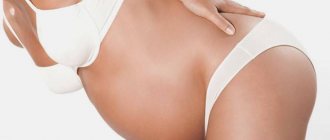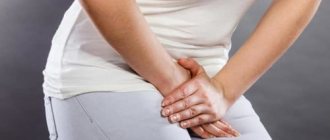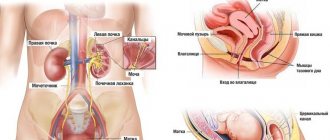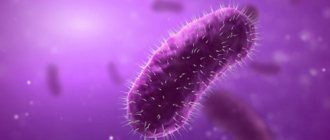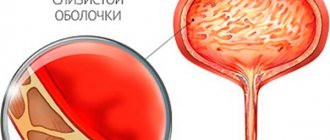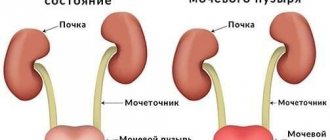If you have ever experienced bladder inflammation, you are unlikely to confuse this condition with something else in the future. Cystitis is an extremely unpleasant illness, although it goes away relatively quickly and responds well to therapy, in the first days the disease brings a lot of inconvenience.
But it’s good if it was acute cystitis, which you identified, cured, and safely forgot about it. And if the disease has already become chronic, then exacerbations, often or not very often, will remind you of it. What to do in this case - how to properly treat exacerbations, how to behave during this time, what regimen and what diet to follow during these days?
Causes of the disease
The main factors influencing the manifestation of cystitis are:
- Frequent exposure to the cold.
- Passive lifestyle.
- Constant problems with constipation.
- Bad habits, unbalanced diet.
- Insufficient fluid intake.
- Treatment of the disease was not started on time.
- Chronic pathologies of the urinary system.
- Insomnia, stressful situations, violation of the work/rest schedule.
- Self-medication.
The disease mainly appears due to poor personal hygiene. The disease also targets people who often change sexual partners. To prevent the disease from reoccurring after treatment, it is necessary to properly monitor hygiene and carry out timely prevention. And if the first signs of illness appear, you should immediately seek help from a doctor.
Nutrition during exacerbation of cystitis
It is strictly forbidden to consume alcohol, pickled, spicy, or smoked foods. Vegetable puree soups and boiled porridges are best suited. Meals should be frequent and small.
In case of recurrent cystitis, you should limit the use of:
- refined sugars (carbonated drinks, sweets);
- starch (potatoes, flour products made from premium flour);
- concentrated proteins (legumes, fish, meat, cottage cheese);
- foods high in salt.
Drinking regime
Maintaining a drinking regime is an important condition in the treatment of chronic cystitis. The patient must drink at least 1.5 liters of fluid. At elevated temperatures, indicating a progressive inflammatory process, it is recommended to drink only clean water with the addition of lemon juice, which will help remove the pathogen from the body and relieve irritation of the bladder mucosa.
If the disease occurs without fever, you can drink almost any fruit and vegetable juices (except tomato). Cranberry-based drinks (juices, fruit drinks, jelly) are considered especially useful for cystitis.
Types of cystitis during relapse
Inflammation can be chronic or acute. If the disease is acute, then it affects the mucous membrane of the bladder.
The cause of the acute form may be hypothermia or the occurrence of an infectious disease. When the first signs appear, it is necessary to urgently begin treatment; if this is not done, the disease becomes chronic. It is much more difficult to treat.
In addition, all the manifestations are not so bright, and the patient may simply not notice the symptoms. Because of this, they do not seek help, and this is the first step towards relapse. Exacerbation of chronic cystitis can occur due to a hidden disease of the internal organs, so it is necessary to undergo an annual preventive examination in order to identify such pathologies in time.
How to eliminate the cause of relapses
Identifying a chronic source of infection means subsequently disinfecting this source. Sometimes this has to be done strictly surgically. It happens that cystitis develops against the background of abnormalities in the structure of the bladder - in this case, surgery may also be necessary. Fortunately, today such operations are available and they are highly effective.
Prolapse of the pelvic floor muscles is also surgically treated: for example, low-traumatic laser vaginal rejuvenation surgery is considered popular today.
It happens that the cause of exacerbation of cystitis is estrogen deficiency. This disease is more often noted during menopause in women. In this case, hormone replacement therapy will be effective. Very often, to treat exacerbation of cystitis, or rather, to influence their prevention, two doctors should work together - a urologist and a gynecologist.
Methods of therapy
If chronic cystitis worsens, you should immediately start taking medications. But it is worth remembering that only a doctor can prescribe medications. If you decide to self-medicate, it is still better to check with your doctor about which medications you need to take.
A urologist will help with this issue. All drug prescriptions will be made based on the results of tests and examinations. If effective therapy was quickly selected and started on time, then it will be possible to easily cope with this disease in a short time. And there will be no relapse. Do not self-medicate under any circumstances, because the consequences can be quite serious.
The method of therapy and medications should only be prescribed by an experienced urologist; if you were unable to get an appointment with him, then a therapist will help. He will select the appropriate treatment, which will be comprehensive. This will mainly involve eliminating the infection and restoring the body. But what to do if the symptoms of the disease do not go away for several days after starting treatment? In this case, it is necessary to re-examine and prescribe tests. Maybe doctors will discover bacterial cystitis. Then the doctor will prescribe the use of other medications.
The first thing you need to take quickly is painkillers and anti-inflammatory drugs. They will help relieve pain.
If you do not have such medicines at home, then before visiting the doctor you should use a hot heating pad and drink plenty of liquid.
Children's cystitis is treated with the same drugs as in adults. They are also prescribed to drink plenty of fluids. If the child does not have allergies, then herbal medicine is prescribed. This could be a decoction of lingonberries or chamomile.
Symptoms of the disease
When cystitis worsens, the bladder becomes inflamed, painful sensations appear when urinating, and a strong desire to go to the toilet does not always correspond to the amount of urine excreted.
At the end of the process, sharp pains and cramps in the lower abdomen appear. These spasms can occur both during emptying and during the process of filling the bladder.
With the next attack of chronic cystitis, the patient exhibits symptoms similar to the acute stage of the disease. In this case, signs of inflammation of the bladder can persist for about seven days, and then be replaced by a period of remission. Treatment of this form of cystitis should be carried out in a timely manner to avoid further complications.
Symptoms of exacerbation of pathology are practically no different from the acute phase. Among them:
- itching or burning after emptying the bladder;
- frequent urge to urinate;
- unpleasant odor and cloudy color of urine;
- pain when urinating;
- slight increase in body temperature (up to 37.5°C);
- acute pain in the lumbar region;
- deterioration of general condition.
Diagnostics
Only a specialist can diagnose the disease. The patient needs to contact a urologist who will conduct an examination and give an opinion. Since cystitis can worsen for several reasons, in order to make sure the diagnosis is correct and prescribe adequate treatment, the doctor will suggest taking tests and undergoing a series of examinations:
- general blood and urine tests;
- Ultrasound of the kidneys and bladder;
- ultrasonography;
- cystoscopy;
- vaginal smear;
- bacteriological culture of urine.
If laboratory tests reveal a sexually transmitted infection, which is the causative agent of cystitis, then PCR (polymerase chain reaction) is prescribed. The analysis will determine the type of pathogenic bacteria and the method of treating the disease.
Treatment of any disease, including cystitis, is based on a careful examination by the doctor of the existing symptoms.
Cystitis is manifested by the following symptoms:
- temperature increase;
- pain in the lower abdominal area;
- bloody discharge when urinating;
- painful and frequent urination;
- small amounts of urine with frequent urge.
All these symptoms together indicate abnormal functioning of the genitourinary system. If this symptomatic picture is detected, women should not attribute everything to menstrual pain, but should immediately go to a medical facility for qualified medical help.
The right medications
The correct method of therapy is selected only by a doctor on an individual basis.
When chronic cystitis worsens, the patient is prescribed antibacterial drugs. It is recommended to take special antibiotics. To cope with pain, it is recommended to drink no-shpu or papaverine.
Suppositories are also great help; they can relieve inflammation and cope with various microbes. Chronic illnesses are also treated with physiotherapeutic methods, which, in parallel with medications, will quickly provide a positive result. For this purpose, heating, magnetic therapy, iontophoresis, and laser treatment are used.
How is the disease treated?
At the first attacks of exacerbation of chronic cystitis, you should immediately consult a doctor. Only a qualified specialist can prescribe an effective therapeutic course.
The chronic phase of cystitis is much more difficult to identify due to the blurred clinical picture and characteristics of the symptoms. To determine future treatment tactics, patients will have to undergo a series of laboratory and bacteriological tests to identify the specific type of viral or bacterial microorganism that provoked inflammation of the genitourinary system.
The final diagnosis is made only on the basis of the results of all instrumental studies and tests of biomaterial (blood, urine).
Treatment of cystitis, which has worsened, is in many ways similar to the tactics of drug therapy in acute cases of the disease.
First of all, patients should observe bed rest, dress warmly and prevent hypothermia. The attending physician will definitely recommend that a patient with bladder inflammation follow a gentle diet. A diet for frequent attacks of cystitis involves avoiding fatty foods with lots of spices.
The basic symptom of infectious and inflammatory diseases of the genitourinary system is a burning and tingling sensation in the urethra during the natural outflow of urine. For this reason, most patients try to go to the toilet less often when they have the urge to urinate.
However, such actions are fundamentally wrong. During attacks of exacerbation of inflammation, you should drink as much fluid as possible to quickly remove toxins from the bladder.
Ordinary distilled water, cranberry juice, and herbal infusions are suitable for this purpose.
As for medicinal effects, doctors focus on prescribing the following drugs:
- antibiotics from the pharmacological group of cephalosporins, fluoroquinolones;
- nitrofuran (antimicrobial) medications: Furazidin, Furagin;
- sulfonamides (drugs with a pronounced bacteriostatic effect): Sulfamethizole;
- To quickly relieve painful symptoms, it is recommended to take antispasmodics that effectively relax the compressed muscles of the bladder: Papaverine, Diclofenac.
Achieving a positive outcome in the treatment of chronic cystitis is possible only with a complex effect on the foci of inflammation. For this reason, doctors prescribe patients to undergo a number of physiotherapeutic procedures: magnetic therapy, external laser exposure, iontophoresis. Only with this approach can treatment lead to a complete recovery of the patient.
Patients suffering from frequent recurrent outbreaks of chronic cystitis should remember the need for regular preventive measures, which include hardening the body, maintaining a drinking regime, taking vitamin complexes, and moderate exercise.
It is necessary to treat inflamed cystitis comprehensively, not forgetting not only about medications, but also about proper nutrition and bed rest. Therefore, therapy should only be prescribed by a specialized doctor who can find the cause of inflammation and select the most appropriate treatment tactics.
Emergency help
At the first symptoms of inflammation, the patient should go to bed and remain in bed until the doctors arrive. It is recommended to call emergency help if an exacerbation is accompanied by:
- acute pain;
- high temperature;
- inability to empty the bladder;
- the presence of blood clots in the urine.
Antispasmodics (No-shpa or Papaverine), a warm heating pad on the abdominal area or herbal tea will help to quickly alleviate the patient's condition.
Drug treatment
During exacerbation of cystitis, the same therapeutic measures are carried out as during the acute phase.
Treatment is aimed at the following activities:
- elimination of symptoms;
- strengthening the immune system;
- suppression of the microbial environment;
- normalization of microflora in the body;
- stimulation of the diuretic process.
Drugs for the treatment of inflammation are represented by various pharmaceutical groups:
- Antibiotics - Norfloxacin, Monural, Furadonin.
- Uroseptics - Canephron, Cyston.
- Physiotherapy - electrophoresis, UHF, paraffin baths, mud compresses.
In addition to pills and procedures, anti-inflammatory suppositories are recommended, which will help alleviate the patient’s condition and increase the period of remission.
Folk remedies
Under no circumstances should you prescribe treatment for yourself. Such a measure can negatively affect the condition of the entire body and lead to further progression of cystitis.
Incorrectly selected medications not only do not help eliminate pathogens, but, on the contrary, can lead to an exacerbation of other “sores” existing in the body. Effective treatment for progressive cystitis is based on traditional therapeutic methods.
Patients are required to be prescribed medications that help:
- strengthening the immune system;
- suppression of the microbial environment;
- restoration of normal microflora in the body;
- stimulation of the diuretic process;
- death of fungi.
The sooner the correct treatment is prescribed, the greater the chance for the patient to quickly return to normal life. Properly selected medications contribute to the death of microbes that cause the development of cystitis. At the same time, the risks of various complications and the transition of the disease to the chronic stage are greatly reduced.
Patients can be prescribed appropriate procedures that stimulate the process of death of pathogenic microorganisms. Additional warming of the bladder can be done at home. This treatment is best carried out not in a bowl of hot water, but with a hot heating pad. It is the heating pad applied to the abdominal cavity that helps to temporarily eliminate the painful signs of cystitis.
Such humid conditions will be optimal for the proliferation of pathogenic microorganisms, as a result of which the disease will progress greatly. Proper treatment of cystitis is always accompanied by consultation with a doctor.
It is the attending physician who controls the course of the disease who promptly stops taking some medications and prescribes others. This measure helps reduce the risk of exacerbation of other diseases of the body.
Traditional medicine recipes
An attack of cystitis at home can be stopped with the help of traditional medicine. If it is used together with traditional treatment, then getting rid of the disease itself can happen faster. However, before you start using traditional medicine recipes, you must consult a doctor.
It is he who will develop the scheme and determine the duration of the course of treatment. Remember, you cannot self-medicate, because this will only cause complications. You can treat chronic cystitis at home in this way:
- Balance your diet.
- Add less salt, seasonings and spices to your dishes.
- Avoid strong tea and coffee.
- Drink enough fluids per day. Mineral water, decoctions and infusions of medicinal herbs are best suited. Decoctions or infusions can be prepared according to the following recipes:
- Infusion of rose hips. You will need forty grams of fruit and one and a half liters of water. Place the rose hips in an enamel bowl, add water and cook after boiling for fifteen minutes. Then turn off the gas and wrap it in something warm, let it sit for forty minutes. After this, you can drink it like tea, adding a little honey for sweetness.
- Infusion of yarrow and chamomile. Take twenty grams of dry plants and pour them into a thermos. Fill with boiling water to the top and close for two hours. Take three times, you can add honey.
- Homemade cranberry juice. Five hundred grams of berries, ground with sugar, in the amount of three hundred grams. Then transfer the resulting mass into a glass jar. Fruit juice can be added to tea or consumed as jam.
Diet
When drinking coffee and alcoholic drinks, the bladder experiences irritation, as a result of which the condition worsens and symptoms of exacerbation of cystitis may appear.
Any cranberry drinks are recommended as a medicinal drink: juices, fruit drinks or jelly. Hippuric acid contained in it protects the walls of the bladder from microbes. This drink should be consumed in the amount of 4 glasses per day. It is also useful to eat cranberries fresh, adding them to yogurt or milk porridge.
Spicy seasoning, black and red pepper should be excluded from the diet - they provoke an inflammatory process. Granulated sugar, pasta, white rice and white flour bread have a beneficial effect on the development of cystitis and an increase in the number of harmful bacteria, so they should be consumed as little as possible.
Causes of exacerbation of the disease
Chronic cystitis may be a primary disease and not appear due to some chronic illness. It is not necessary that this disease will cause pathology of the human urinary system. Exacerbation of cystitis is possible if E. coli, staphylococcus bacteria, streptococcus or other infections enter the body.
If you start treatment on time, it is possible to get rid of these “enemies” in a short time. Only any drug treatment must be carried out under the supervision of a doctor. Also, do not forget that traditional medicine will also help in treatment; it will not only strengthen human health, but also immunity.
If you interrupt treatment with antibiotics, then an exacerbation of cystitis occurs and in this case, the person does not know what to do until he consults with a doctor. This can happen when, at the first retreat of symptoms, the patient stops taking medications, which is absolutely impossible to do.
In case of exacerbation of cystitis, the use of medications must be continued continuously for a week and a half, and in some cases even more.
Remember that constant hypothermia of the body, weak immunity, and female diseases can also provoke the appearance of cystitis.
Why does it worsen?
According to statistics, patients come to the doctor with a chronic disease. New cystitis is treated incorrectly and haphazardly, which is fraught with the development of a chronic form of the disease. But with exacerbations, it’s not clear what to do; self-medication does not bring results, which is why patients go to specialists.
Again, according to statistical information, every fourth woman (and in some sources – a third) experiences acute cystitis at the most active and working age. And in a third of all these patients the disease becomes relapsing. Usually the next exacerbation is recorded within 3 months.
Are periods and cystitis related?
Most often, exacerbation of the disease occurs before menstruation. This occurs due to various changes in the body associated with an increase in the amount of sex hormones. This can also happen if there is an inflammatory process in the female body, and not only in the genitals. However, it is gynecological diseases that change the microflora of the vagina, which is why various inflammations appear.
The most common reason why cystitis appears before menstruation is candidiasis. It should be noted that the mucous membrane of the bladder is too susceptible to various types of fungi. Therefore, a woman may not notice the occurrence of thrush, but she will detect cystitis in any case. However, inflammation of the bladder may also indicate the presence of a sexually transmitted disease, which the woman may not even know about. Therefore, consultation with a specialist on how to relieve an attack of cystitis, precisely during its exacerbation, is very important.
The best time to treat cystitis is during menstruation, because the body already cleanses itself on its own. When the cause of the disease is thrush, then treatment should begin with antifungal therapy. Antibiotics are prescribed over a wide spectrum, because only they can treat diseases associated with several pathogenic organisms at the same time.
In parallel with this treatment, it is necessary to take medications that normalize the microflora, thus avoiding the risk of dysbacteriosis. It may appear after using antibiotics.
In some cases, even if treatment was successful, relapse may occur during menstruation. This is why preventative measures are necessary.
Treatment
Every woman should follow the rules so as not to resort to labor-intensive treatment of cystitis:
- You should not overcool your body by sitting on the ground or rocks.
- During the cold season, you should not swim in an ice hole and wear short skirts and thin nylon tights.
- Every day you need to drink at least 2 liters of liquid.
- If any inflammatory processes occur that are caused by an infection, you need to get rid of them immediately.
- Every six months it is necessary to undergo a gynecological examination by a doctor.
- If your lifestyle is more sedentary, you should do a short warm-up every hour.
- If dietary nutrition is necessary, you need to adjust the diet so that there are no problems with stool.
- When using tampons, they should be changed frequently, every 2 hours.
- If you want to go to the toilet, you should never endure it.
- After each sexual intercourse, it is important to wash yourself or use wet wipes for intimate hygiene.
In the treatment of cystitis, antibiotics and sulfonamides are used, but they must be prescribed after carrying out the necessary tests, since each drug acts on certain types of bacteria. And after the analysis, the infectious bacterium that causes the disease is revealed, and it is this that needs to be destroyed when using a pharmaceutical product.
Possible preventive measures
What do women do if the symptoms of cystitis worsen, because this brings a lot of discomfort? In general, every woman should prevent the disease. To do this, you just need to monitor your health and constantly strengthen your immune system, drink vitamin complexes, and strictly follow all doctor’s prescriptions and recommendations.
Prevention can be piercing, which strengthens the immune system, walking in the fresh air, active life, and physical education. These simple rules will help reduce the risk of disease.
It is also necessary to note the benefits of a special diet. It will quickly relieve the signs of acute cystitis. Do not eat seasonings, smoked meats or alcohol. Add more fresh vegetables and fruits, dairy products and more fluids to your daily diet.
What routes does the infection take to enter the bladder?
Indeed, there are several ways of infection of an organ. The most “popular” path is upward. Microorganisms or viruses enter it through the urethra (this path is characteristic of both women and men with equal frequency).
The descending path means that the inflammatory process forms in the kidneys, and then descends through the pelvis to the bladder itself. The hematogenous route means transmission of infection through the blood: this option is more often diagnosed in men.
Signs of cystitis in women
Symptoms of cystitis in women:
Sometimes an admixture of blood ( hemorrhagic cystitis) or pus appears in the urine, as well as an unusual odor, especially when going to the toilet for the first time in the morning. Although the symptoms are frightening, the disease itself is not very dangerous. If unpleasant phenomena do not go away within 1-2 days, you should seek medical help.
Which doctor should I go to if a woman has signs of cystitis? First, go to your family doctor.
The first thing he will do is send you for a urine test. Before taking the test, a woman needs to wash herself thoroughly, release a little urine into the toilet, and only then direct the stream into a sterile glass, which is provided at the clinic.
The results should only be deciphered by a doctor. But today, when medical information is widely available, people like to think about the analysis form themselves.
Doctors call these results false negatives. They can be caused by severely diluted urine or improper treatment. Although, perhaps, the inflammation was not caused by microbes, and we need to look for another reason.
This may indicate a chlamydial infection (chlamydia). Or that a woman gave urine during a period close to menstruation.
That is, the analysis can be interpreted in different ways. You should not do this by using the Internet and diagnosing yourself. Only a doctor can establish the complete picture of the disease, and only he, based on all the data obtained, can prescribe the right medicine for cystitis.
Why does cystitis develop?
The development of pathology primarily occurs due to non-compliance with personal hygiene rules. People who have an active sex life with different partners are susceptible to the disease. Other factors that give impetus to the development of pathology include:
- systematic hypothermia of the body;
- inactive life position;
- problematic defecation process and prolonged constipation;
- poor quality nutrition, addictions;
- drinking small amounts of liquid;
- delay in the therapy process;
- systematic pathologies of the genitourinary department;
- psycho-emotional fatigue, disorganization of the daily routine;
- self-prescribed therapy.
Menstruation
During or before menstruation, characteristic signs of cystitis in women may appear. Most likely, the appearance of pathogenic organisms on the walls of the mucous membrane is associated with weakened immunity. However, other reasons cannot be excluded.
Intimate hygiene products should be changed every 3-4 hours. This is associated with certain inconveniences, but maintaining health is much more important. You should always remember this!
Menstrual guards, which have become widespread, are frowned upon by many doctors in the field of gynecology. Firstly, they are reusable, and this no longer bodes well. Secondly, it is absolutely impossible to call them convenient: removing and thoroughly sterilizing the cup outside the home is problematic. Thirdly, keeping the device in the vagina for a long time leads to deterioration of hygiene in any case.
Sexual activity during the menstrual cycle has a negative impact on a woman's health. To prevent the disease from developing, it is necessary to abstain from intimacy with your partner for some time.
Cystitis in women, causes, symptoms, treatment, diet for cystitis
Cystitis in women is a very common problem.
The reason is in anatomical features. The bladder in women works more actively than in men and requires emptying more often. He often becomes the target of attack by microbes.
that inflammation of the urinary tract (cystitis) is considered a typically female disease.
Statistics say that there is no woman who has not suffered from cystitis at least once in her life. Inflammation is provoked mainly by Escherichia coli (the microbe E. Coli). This is also explained by anatomy: in women, the genitals are located close to the anus, and E. coli has more opportunities to enter the urinary system. Including during sex. There is even a term: “honeymoon cystitis,” when inflammation occurs due to increased sexual activity. However, the causative agents of infection are also Proteus, Klebsiella, Enterococcus, as well as gonococci or chlamydia. Fungal infections of the urinary tract occur only when the immune system is severely weakened and are mainly caused by fungi of the genus Candida.
Most representatives of the fairer sex experience a urinary infection at least once in their lives, and for many more than once.



